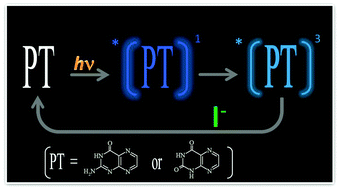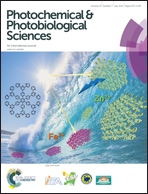Selective quenching of triplet excited states of pteridines
Abstract
Steady-state and time-resolved studies on quenching of excited states of pterin (Ptr) and lumazine (Lum) in the presence of iodide in aqueous solution have been performed. In contrast to the typical iodide enhancement in the triplet state population, iodide promotes a fast non-radiative T1 → S0 transition for both Ptr and Lum. In this work, we present evidence for the effective iodide-induced deactivation of singlet and triplet excited states, with rate constants close to the diffusion-controlled limit (between 3 × 109 M−1 s−1 and 1 × 1010 M−1 s−1). The longer lifetimes of the triplet excited states over the singlet excited states increase the probability of deactivation (kTqτ0T ≫ kSqτ0S). Therefore, at micromolar concentrations of iodide, where the deactivation of the singlet excited state is negligible, an efficient deactivation of the triplet excited states is observed. This selective deactivation of the excited triplet state is an analytical tool for the study of photosensitized reactions where pteridines are involved.


 Please wait while we load your content...
Please wait while we load your content...